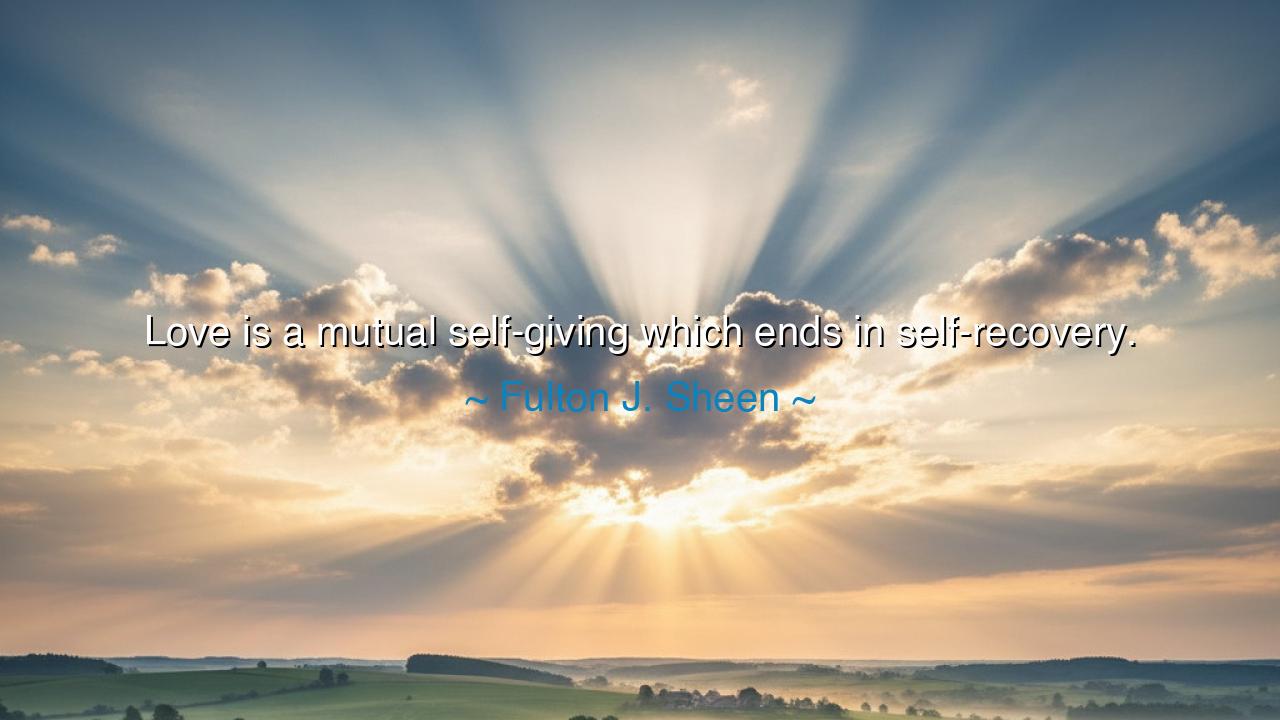
Love is a mutual self-giving which ends in self-recovery.






When Fulton J. Sheen wrote, “Love is a mutual self-giving which ends in self-recovery,” he unveiled one of the deepest mysteries of the human soul — that in true love, the act of giving does not diminish us but completes us. Sheen, a man of both intellect and faith, spoke not of sentimental affection, but of the sacred exchange through which two souls, in giving themselves wholly, become more fully themselves. In love’s paradox lies its power: we lose ourselves in another, and yet, in doing so, we find the truth of who we are.
In every era, men and women have wrestled with the meaning of love — is it sacrifice, or is it fulfillment? Sheen’s answer bridges both. To love is to give without measure, to offer the heart without fear, to pour oneself out for the good of another. Yet unlike mere surrender, this giving is mutual — it is not the erasure of self, but the meeting of equals in shared devotion. In the balance between giving and receiving, the soul is purified. Through love, the self expands beyond its narrow confines and discovers its divine reflection in another being.
The ancients knew this wisdom well. The Greek philosopher Aristotle called friendship “one soul dwelling in two bodies,” while the mystics of the East spoke of love as the mirror through which one glimpses the infinite. To give oneself is not to vanish, but to awaken — to find, in the act of offering, a greater wholeness. Sheen’s words remind us that the truest form of love is never domination or dependence, but harmony: two hearts exchanging their essence, each enriched, each renewed.
History offers luminous examples of this sacred exchange. Consider the union of Elizabeth Barrett and Robert Browning, poets whose love was forged in secrecy and tested by distance. Elizabeth, frail in body but fierce in spirit, risked her family’s scorn to be with the man who saw her not as an invalid, but as a soul of fire. Their letters — tender, reverent, alive with thought — reveal the truth Sheen proclaimed. Each gave entirely to the other, not in loss but in liberation. In loving Robert, Elizabeth recovered her courage; in loving Elizabeth, Robert found his purpose. Their love was not the fading of two lights, but the joining of flames into one greater brilliance.
Mutual self-giving demands courage, for it asks the heart to release its defenses. It is easier to love halfway — to give only as much as pride allows. But such love never leads to self-recovery; it remains incomplete. Only when both souls meet in vulnerability — when they dare to trust, to forgive, to serve — does love reveal its true power. In giving fully, we confront the illusion that love is a transaction. It is not. It is transformation — a union in which the self, though given away, returns purified, larger, freer, more luminous.
Sheen’s insight applies not only to romance, but to all human bonds. In friendship, in parenthood, in service to others, the same law holds: when we give sincerely of ourselves — time, attention, compassion — we do not grow poorer. We recover the hidden parts of our humanity that selfishness had buried. The teacher who gives to her students, the soldier who gives for his nation, the friend who listens in silence — all rediscover themselves in love’s great cycle of loss and return. To love is to become whole again.
Let this be the teaching you carry forward: give yourself fearlessly, but give yourself wisely. Love not to possess, but to uplift. Do not count the cost, for the heart that gives freely is the heart that grows. Do not be afraid to lose yourself in love, for in love’s giving, there is no true loss — only renewal. To hold back is to remain incomplete; to give wholly is to find the infinite within your own soul.
Thus, as Fulton J. Sheen teaches, “Love is a mutual self-giving which ends in self-recovery.” It is the divine rhythm of existence itself — the ocean that gives and receives, the breath that exhales and returns. When you love in this way, you no longer live merely for yourself, but through the greater life that love awakens in you. For love, given freely and received humbly, is not the end of self — it is the beginning of eternity.






AAdministratorAdministrator
Welcome, honored guests. Please leave a comment, we will respond soon